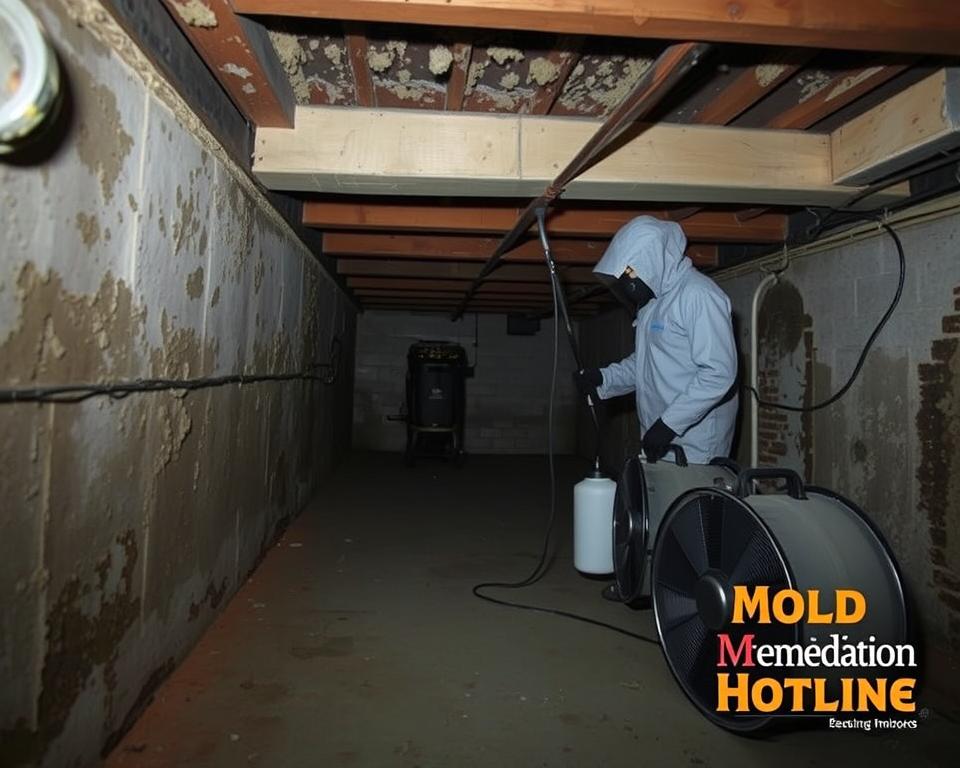Discovering fungus in your crawl space is scary. It can hurt your home’s air and health. So, treating crawl space fungus is very important.
To fix crawl space fungus, you need to know why it happens and how to stop it. By treating and preventing fungus, your home will be safer and healthier for everyone.
Introduction to Crawl Space Fungus
Act fast if you find fungus in your crawl space. It can cause big problems if not fixed. By treating fungus, you keep your home and family safe.
Key Takeaways
- Effective crawl space fungus treatment is vital for maintaining indoor air quality and home health.
- Mold removal in crawl space is a critical step in preventing further damage and health risks.
- Understanding the causes of crawl space fungus is essential for implementing proper treatment and prevention strategies.
- Regular inspections and maintenance can help identify and address crawl space fungus issues early on.
- Professional crawl space fungus treatment services can provide effective solutions for severe infestations.
- Preventative measures, such as improving ventilation and controlling moisture levels, can help minimize the risk of crawl space fungus growth.
Understanding Crawl Space Fungus
Crawl space fungus is common in many homes. It happens when there’s poor air flow and too much moisture. Preventing fungus in crawl spaces means good air flow, controlling moisture, and regular checks.
A professional treatment can get rid of fungus and stop it from coming back. But, you must fix the moisture and air problems too. Common fungus types include:
- Aspergillus
- Cladosporium
- Penicillium
These fungi can make bad smells, cause allergies, and even damage your home. Knowing about these risks helps you keep your home safe and healthy.
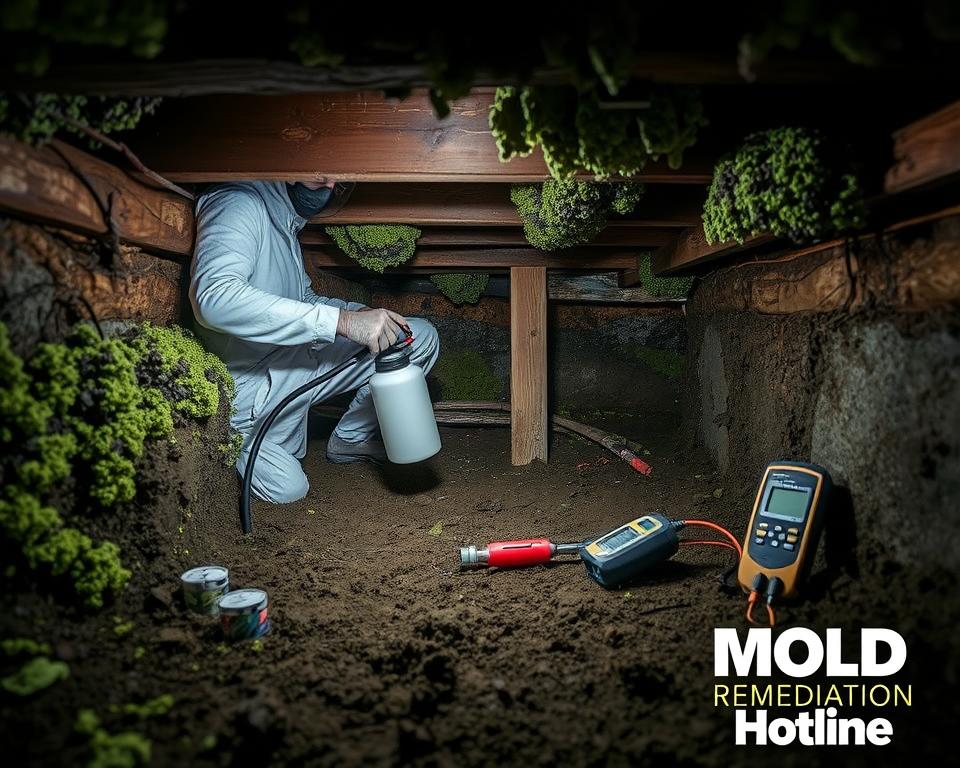
A professional treatment can solve fungus problems. They clean, fix damage, and stop more fungus. This keeps your home safe and healthy.
| Type of Fungus | Common Causes | Health Risks |
|---|---|---|
| Aspergillus | High humidity, poor ventilation | Allergic reactions, respiratory issues |
| Cladosporium | Moisture, water damage | Headaches, fatigue, allergic reactions |
| Penicillium | Poor air quality, high humidity | Respiratory issues, allergic reactions |
Knowing about crawl space fungus helps you prevent it. Regular checks and a professional treatment can keep your home safe and healthy.
Signs of Fungus in Crawl Spaces
Finding fungus in crawl spaces is very important. It can harm your home and health. To stop fungus, controlling moisture is key. Experts in fungus removal can help.
Some common signs of fungus in crawl spaces include:
- Visible mold and mildew growth on walls and floors
- Musty odors and unpleasant smells
- Water stains and discoloration on surfaces
- Warped or rotting wood
A strong, musty smell in the crawl space means fungus might be there. Even if you can’t see it. Homeowners should watch for these signs and act fast. They should talk to fungus remediation experts for help with crawl space moisture control.
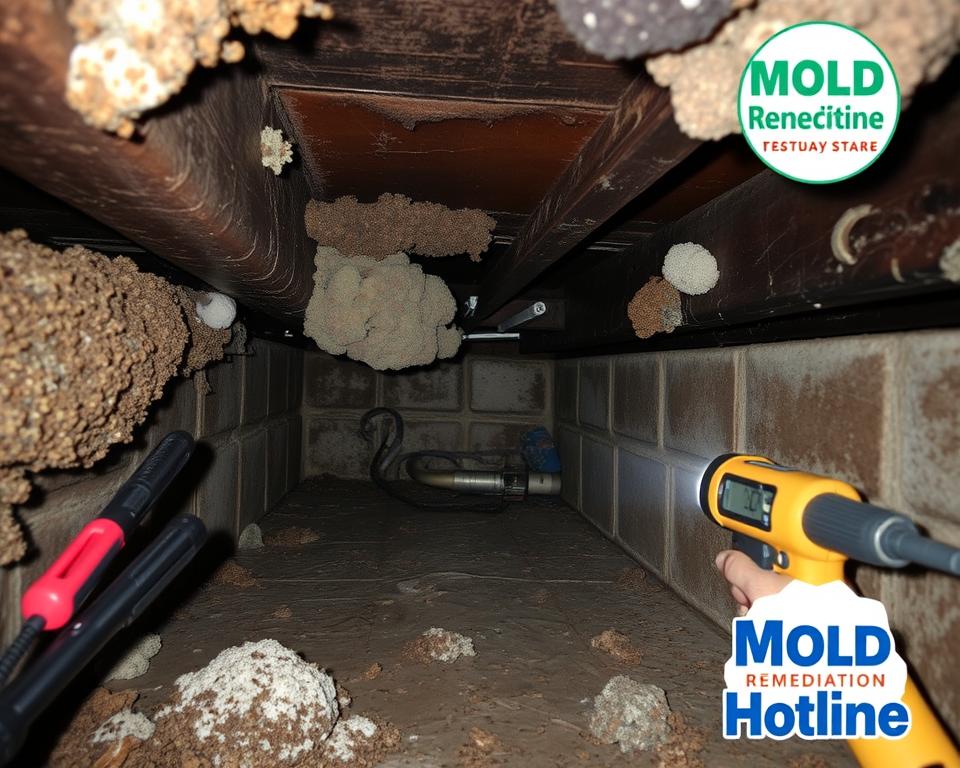
By spotting fungus signs early, homeowners can avoid big problems. Regular checks and upkeep are key. Talking to fungus remediation experts can give you the right advice for crawl space moisture control.
| Signs of Fungus | Description |
|---|---|
| Visible Mold and Mildew | Growth on walls and floors, often accompanied by a musty odor |
| Water Stains and Discoloration | Indications of water damage and possible fungus growth |
| Warped or Rotting Wood | Structural damage from fungus and moisture |
Causes of Crawl Space Fungus
Crawl space fungus is common in many homes. Knowing why it grows is key to stopping it. Moisture, bad air flow, and structural issues often cause it. To fix these, getting the best fungus treatment is important. This might include sealing the crawl space to keep fungus out.
Some main reasons for fungus in crawl spaces are:
- Moisture and humidity problems, like bad drainage or leaks
- Poor air flow, from not enough vents or blocked ones
- Structural issues, like foundation or wall cracks, letting moisture in
Fixing these problems helps stop fungus. Good air flow, controlling moisture, and fixing structures are key. Sealing the crawl space also helps keep fungus away. 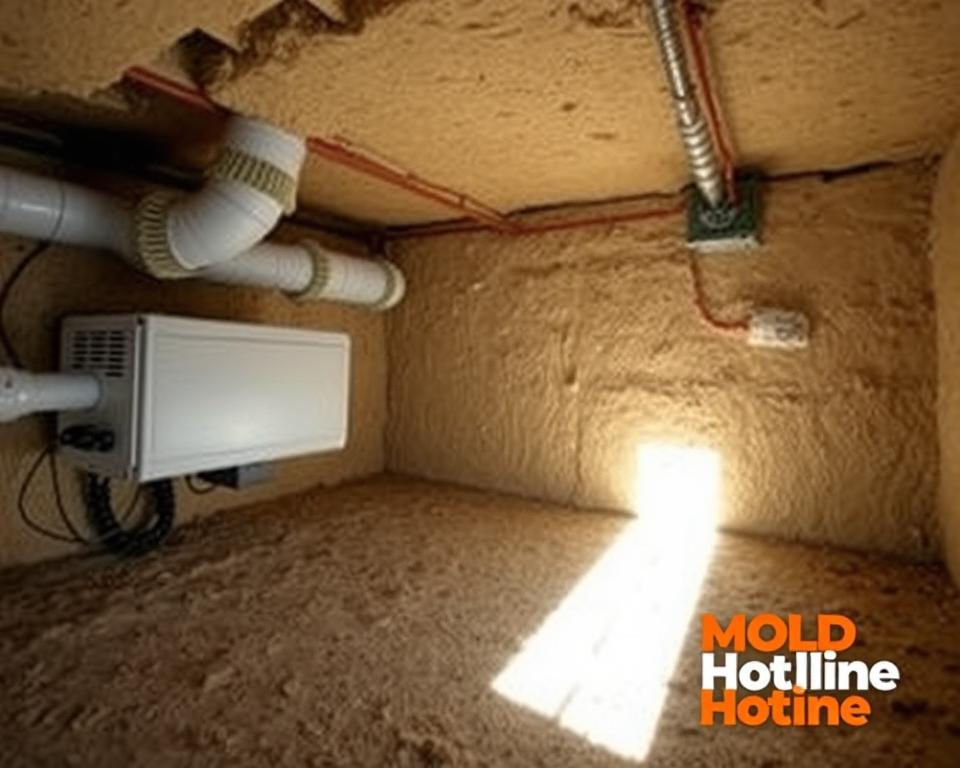
Regular checks and upkeep are also vital. They catch problems early. Working with experts for fungus treatment keeps crawl spaces safe and fungus-free.
| Cause of Fungus | Prevention Method |
|---|---|
| Moisture and Humidity | Proper Drainage and Ventilation |
| Poor Ventilation | Adequate Airflow and Vent Installation |
| Structural Problems | Foundation Repairs and Crack Sealing |
Health Risks Associated with Fungus
Fungus in crawl spaces can harm people’s health. It’s important to find ways to stop this. Fungus can cause allergies and breathing problems.
Fixing the fungus problem is key to staying healthy. Some health risks from fungus are:
- Respiratory issues, such as asthma and bronchitis
- Allergic reactions, including skin irritation and congestion
- Infections, mainly in people with weak immune systems
Using good solutions for mold is vital. This keeps homes safe and healthy for everyone.
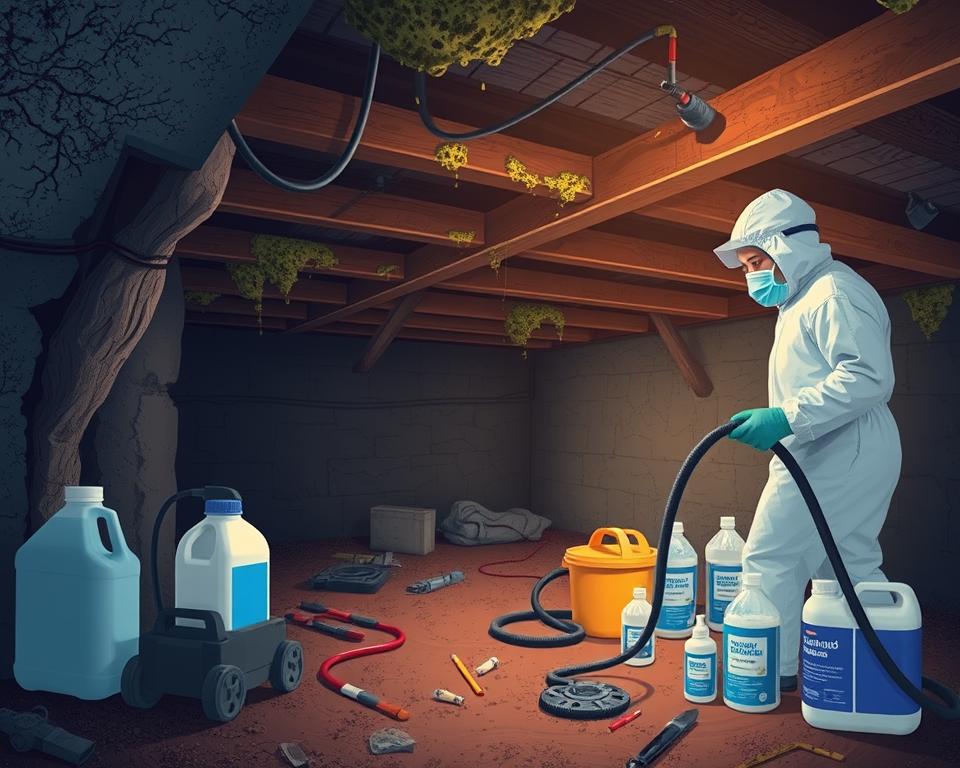
Checking crawl spaces often helps catch problems early. Taking action early keeps homes safe and healthy.
| Health Risk | Description |
|---|---|
| Allergies | Triggered by fungal spores, leading to respiratory issues and skin irritation |
| Respiratory Problems | Exacerbated by fungal growth, leading to conditions such as asthma and bronchitis |
| Long-term Health Effects | Potential for chronic illnesses and infections, mainly in people with weak immune systems |
Inspection and Assessment
Checking for fungus in crawl spaces is very important. It helps find out how bad the problem is. Then, it decides the best way to fix mold removal in crawl space. A pro can look closely at the area and find hidden fungus.
Homeowners can also check themselves. Here are some easy tips:
- Look for visible signs of fungus, such as discoloration or musty odors
- Check for moisture accumulation, which can contribute to fungus growth
- Inspect ventilation systems to ensure proper airflow
A professional fungal treatment can safely remove fungus from crawl spaces. They use special tools and methods. This makes sure all fungus is gone and won’t come back.
Getting a pro to inspect and assess your crawl space is smart. It keeps your home fungus-free. And it helps keep your living space healthy and safe.
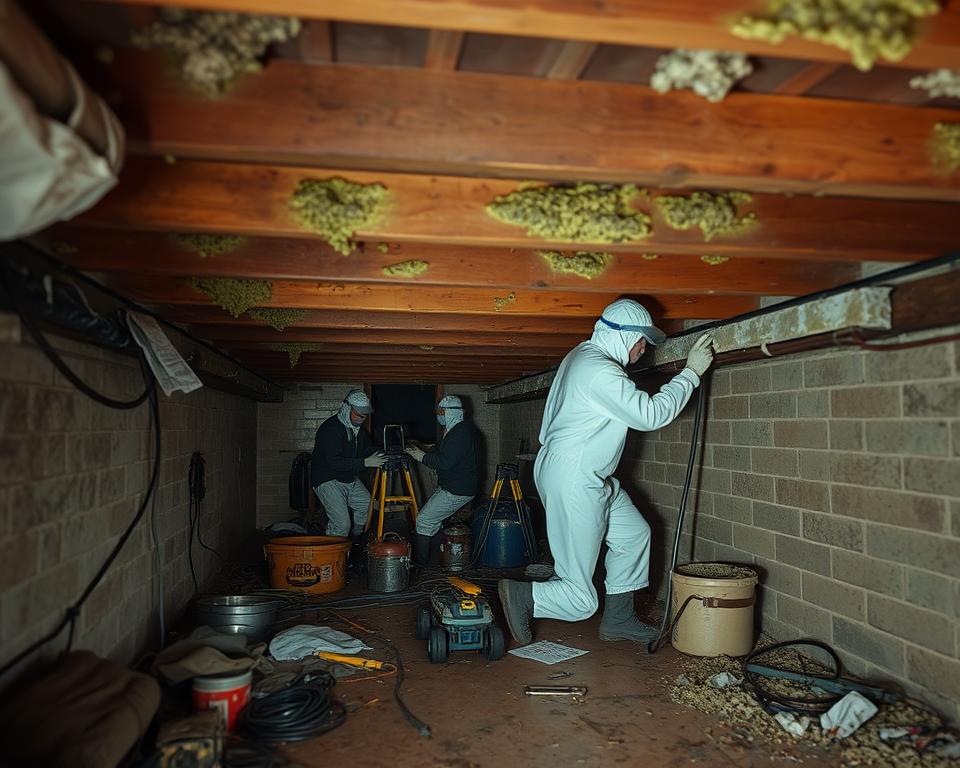
| Inspection Method | Benefits |
|---|---|
| Professional Inspection | Comprehensive evaluation, detection of hidden signs of fungus growth |
| DIY Inspection | Proactive approach, cost-effective, identifies visible signs of fungus |
Treatment Options for Crawl Space Fungus
There are many ways to treat crawl space fungus. Keeping the crawl space dry is key. This can be done with chemicals, natural methods, or by hiring experts.
To stop fungus, you must find and fix the moisture problems. This means fixing bad ventilation and any structural issues. Keeping the area dry helps prevent fungus and makes your home healthier.
Chemical Treatments
Chemicals are often used to fight fungus. Fungicides are applied to kill the fungus. But, chemicals might not solve the problem and may need to be used again.
Natural Remedies
Natural options like essential oils and borate solutions can work too. They are safer for the environment. But, how well they work depends on the fungus’s size.
Professional Remediation Services
Hiring experts is usually the best choice. They check the crawl space, find the fungus’s cause, and create a plan. This way, they fix the problem for good.
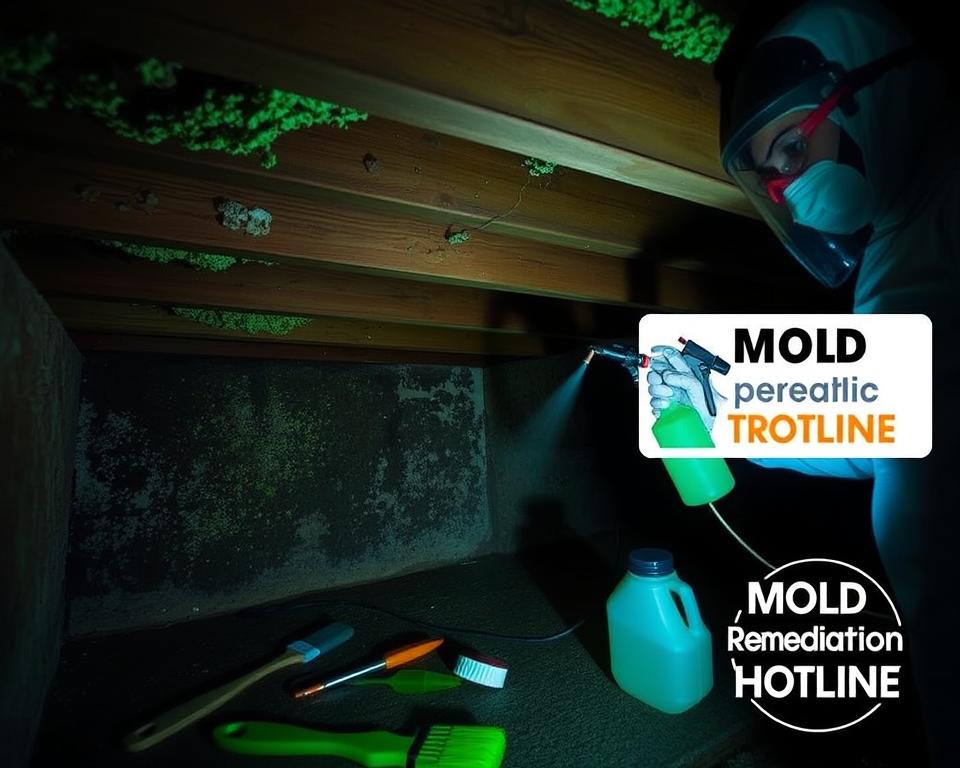
| Treatment Option | Effectiveness | Cost |
|---|---|---|
| Chemical Treatments | Medium | $$ |
| Natural Remedies | Low-Medium | $ |
| Professional Remediation Services | High | $$$ |
Preventative Measures
To stop crawl space fungus, taking steps ahead is key. Experts say to improve air flow in the crawl space to lower moisture. You can do this by adding vents or fans for better air movement.
By keeping moisture down, you stop fungus from growing. This means you won’t need to call in fungus treatment services as often.
Keeping up with maintenance is also important. Check the crawl space often for moisture or fungus. Use a dehumidifier or make sure it’s well-insulated to lower humidity.
Improving Ventilation
Getting more air into the crawl space helps stop fungus. Here’s how:
- Put in vents or fans for better air flow
- Make sure it’s well-insulated to keep humidity low
- Use a dehumidifier to cut down moisture
Controlling Moisture Levels
Keeping moisture levels low is key to stopping fungus. Here’s how:
- Fix any water leaks or damage
- Make sure the crawl space slopes right to avoid water
- Use a moisture barrier to keep moisture out
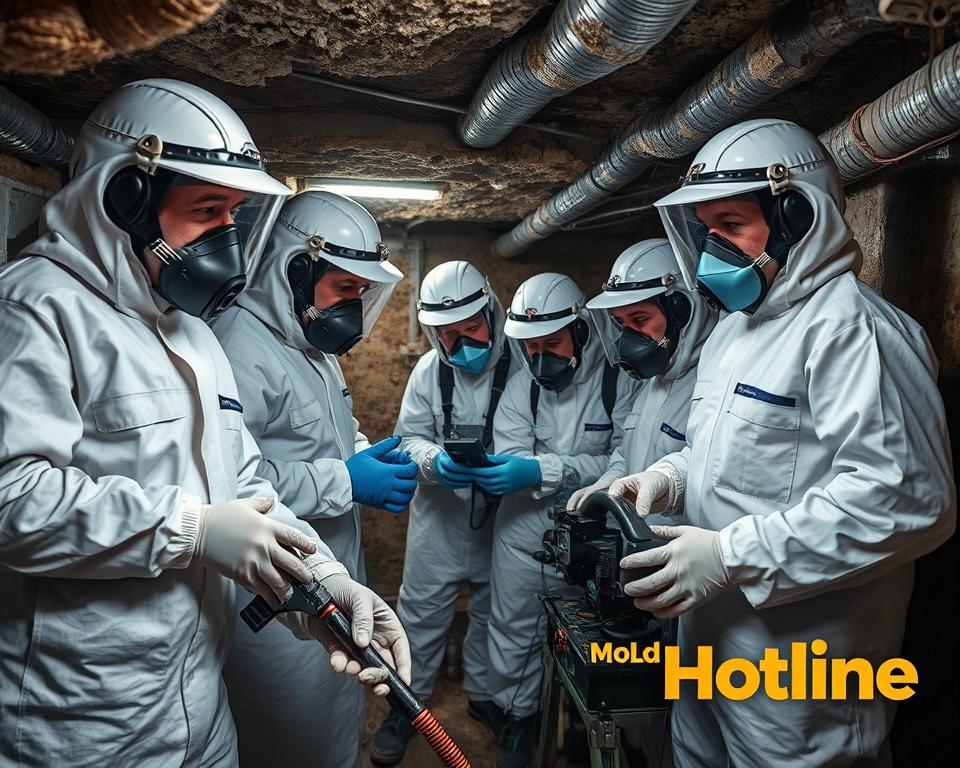
By taking these steps, you can lower the chance of fungus in your crawl space. Regular checks and better air and moisture control keep it dry and fungus-free.
| Preventative Measure | Benefits |
|---|---|
| Improving Ventilation | Reduces moisture levels, prevents fungus growth |
| Controlling Moisture Levels | Prevents water damage, reduces risk of fungus growth |
| Regular Maintenance Practices | Identifies problems early, before they get big |
The Importance of Proper Drainage
Proper drainage stops fungus in crawl spaces. Water in crawl spaces is bad for fungus. Fixing drainage is key to stopping mold.
Crawl space encapsulation is a top choice. It keeps moisture out. This stops fungus from growing.
There are many drainage solutions:
- French drains: a trench filled with gravel and a perforated pipe that directs water away from the crawl space
- Sump pumps: a device that pumps water out of the crawl space and away from the foundation
- Gravity-fed drainage systems: a system that uses gravity to direct water away from the crawl space
Importance of Gutter Systems
A good gutter system keeps water out of crawl spaces. Clogged gutters let water spill into crawl spaces. This is bad for fungus.
Keep gutters clean to stop water problems. This helps keep crawl spaces dry and fungus-free. It’s very important in rainy or flood-prone areas.
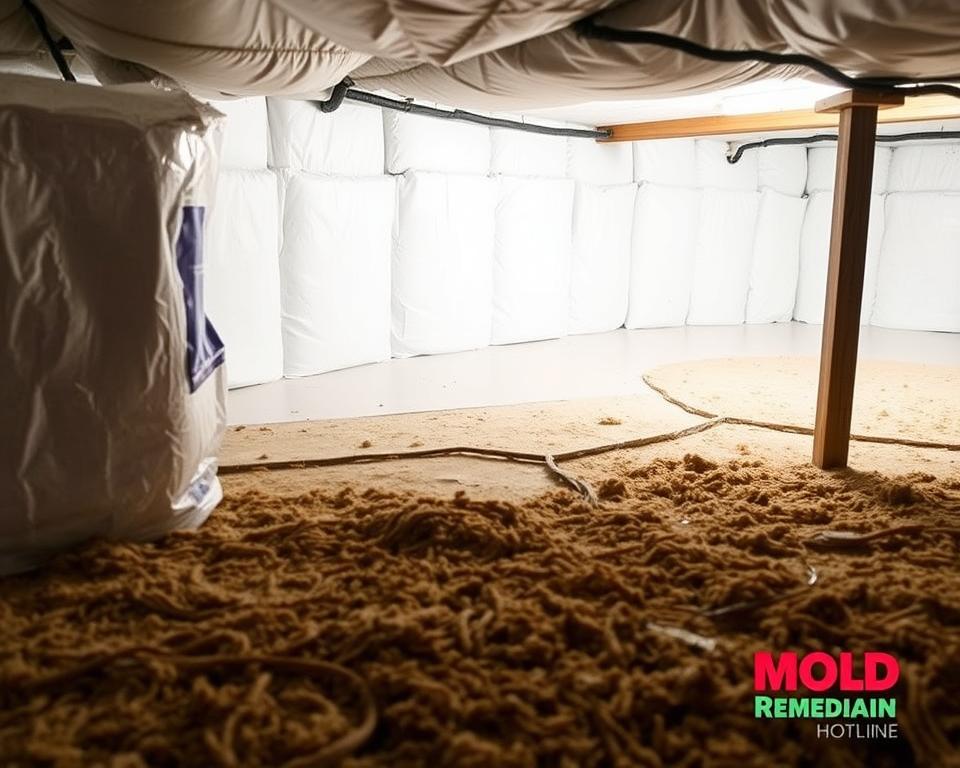
Cost of Crawl Space Fungus Treatment
The cost to treat fungus in crawl spaces can change a lot. It depends on how bad the fungus is, how big the space is, and the treatment methods. Professional mold removal in crawl space services can cost from a few hundred to several thousand dollars. It’s important for homeowners to know this to plan their budgets.
Things that affect the cost include how much fungus there is, what kind it is, and if repairs are needed. For example, if the fungus damaged the structure or insulation, you might have to pay more for fixes. 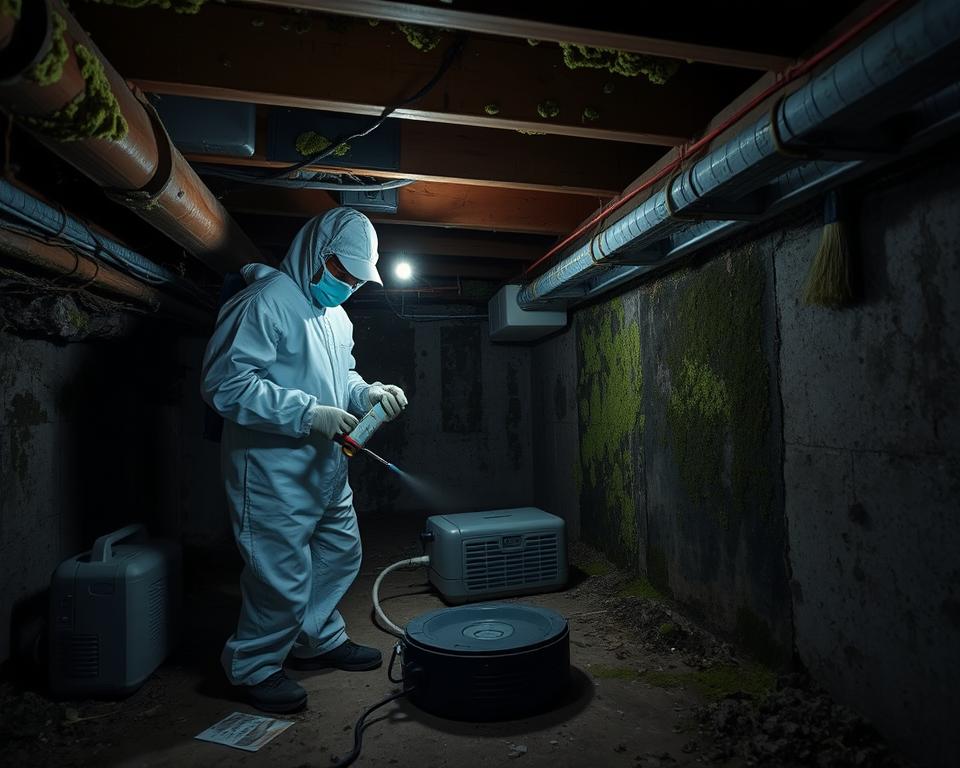
Factors Influencing Treatment Costs
- Severity of the infestation
- Size of the crawl space
- Methods used for treatment
- Need for additional repairs or maintenance
Average Pricing for Services
Prices for treating fungus in crawl spaces can be from $500 to $2,000 or more. Mold removal in crawl space services might cost more if special tools or methods are needed. Homeowners should ask for quotes from different companies to find the best deal.
| Service | Average Cost |
|---|---|
| Crawl space inspection | $200-$500 |
| Mold removal in crawl space | $500-$2,000 |
| Crawl space fungus treatment | $1,000-$3,000 |
Long-Term Management Strategies
Keeping your crawl space fungus-free needs effort and planning. You must check it often and keep it clean. It’s smart to get a pro to check it at least once a year.
Regular Inspections and Maintenance
When you can’t get a pro, look at your crawl space yourself. Watch for changes in moisture, air flow, or fungus. Fixing small problems early can save you money later.
Keep your crawl space clean and dry. Make sure water flows away and fix any damage. This helps keep it fungus-free.
Educational Resources for Homeowners
Want to know more about stopping crawl space fungus? There are many resources out there. Talk to local experts, use online guides, or join forums.
Learning and acting fast can keep your home safe and healthy. Stay informed and proactive to protect your home.
